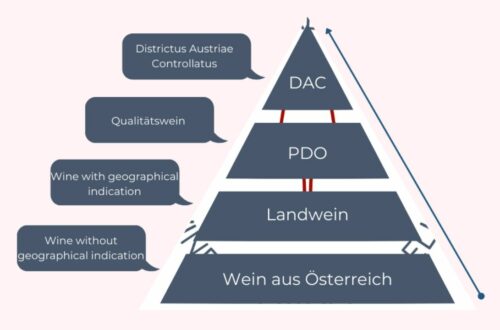
Why are Austrian wines not as well known as of other countries?
As you know, I’m a big fan of Austrian wines. They have several different wines and the value for money is GREAT…unlike some French wines. Considering this aspect, people should be all travelling Austria-wards to get those wines… But this is NOT the case (which is actually really good for me and you!)
So how come they’re not as well known as of other countries?
Let’s find out, shall we?
Because of its history
Did you know? Austria used to be the third wine country in the world! So, what happened?
Well Austrian wines have sort of a hiccup history… If you’re interested in knowing all about it, check out my article on the history of wine in Austria.
But the thing that really tore Austrian wines’ reputation is the scandal of 1985.
Indeed, it was quickly observed that there were more exported wines than produced wines, from Burgenland and the prestigious village of Gumpoldskirchen. In 1985, it was discovered that the exported wine had been altered, that it had been dosed with diethylene glycerol, an antifreeze, bringing sweetness to the wines. Four producers were charged.
ANECDOTE : A year later, more than twenty people died because of this practice in Italy. However, for unknown reasons, this will not tarnish the latter’s reputation.
It took them several years to overcome the damage. And it was mostly due to one man : Alois Kracher. In 1993, he traveled to London to take part in a blind tasting. There, he presented Austrian sweet white wines alongside the greatest Sauternes, with Châtea d’Yquem in particular. His wines were a sensation!
Another famous blind tasting was the “The London Tasting”, organized in 2002 by Jancis Robinson MW and Tim Atkin, comparing Grüner Veltliner wines and Chardonnays. These international wines came from wineries such as Ramonet, Louis Latour, Jadot, Gaja (Italy), Mondavi (California) and Penfolds (Australia). The first four places were taken by local Grüner Veltliner and Chardonnay.
So although, it didn’t bring Austrian wines reputation to its former one, it helped incredibly and Austria was no longer ashamed of its wines.
Because of its limited production…
Austrian wines are not known as well as of other countries due to its limited production.
Today, the vineyards lies on 46 500ha, which represents less than half of Bordeaux, and one-tenth of French vineyards.
It is also due to a change of generations. Indeed, wineries are mostly family owned. When you walk in these wineries, it is not uncommon to be greeted by someone in its thirties, who controls both the farming and the winemaking. These young people have often travelled in many countries and know the different methods in winemaking worldwide. They usually yields and hence quantity to improve quality.
… and limited exportations
Austrians love their wines! They mostly drink it in Heurigers. So, what is that? These are inns where you can drink the wines from the wineries the Heuriger (or Buschenshank) belongs to. You often get served local food too. I love those, it’s very welcoming.
It all started on the 18th century when Marie-Thérèse and François-Jospeh II brought viticulture up to date. More specifically, on August 17, 1784, Josephinische Zirkularverordnung authorizes “to sell or serve at any time of the year the foods, wines and fruit wines produced by him, no matter how, at what time and at what price“.
So of course, after the Austrians own thirst has been slaked, there isn’t much left for the others, ie for export. Most of it is sent to Germany, Switzerland and the USA.
Because of its lack of marketing
Compared to other wine-producing countries, Austria doesn’t promote its wine globally. Lack of investement in marketing or just to protect themselves? I guess a little bit of both.
This means that Austrian wines are often not available in foreign wine stores and restaurants.
This results in wine drinkers not being familiar with Austrian wines. I have a French “tasting” group and some of them know way more about wine than me (or at least in the beginning) – and this includes foreign wines, such as Italien wines and Spanish wines- and I was the one to make them discover Austrian wines…. just because I used to travel a lot to Austria!
Complexity of the labelling system
With all the several reasons noted above, the complexity of the labelling system doesn’t help… How can you expect a rookie or even someone who knows about wine to choose the wine they want among all the different wines?
One has to have knowledge about what to lookout for… And Austria, just as Germany has a complex labelling system.
Austria produces mainly PDO wines. PGI wines bear the mention Landwein and those without geographical indictation the mention Wein. PDO wines represent four states and 16 other smaller areas, as Qualitätswein or DAC.
In these Qualitätswein, a Prädikatswein level can also be indicated. Prädikatswein levels give more of an indication of wine style than quality.
There are, to date, 18 DACs (Districtus Austriae Controllatus). They are created when producers in a region can agree on one or more grape varieties. Within these DACs, there are also levels of quality and style… which differ from one DAC to another.
This creates a very complicated labelling system that many people get lost into. And, you don’t want to end up with a headache when you choose your wine, now do you?
Conclusion : Why are Austrians wines not as well known as of other countries?
Austrian wines are not as well known as of other countries for four main reasons.
The first one is its history. The antigel scandal of 1985 led to Austrian wines industry’s downfall and Austria never fully recovered.
Its limited production, due to its small vineyard area and the difference in winemaking, is a second reason which leads directly to the third one with its limited exportations.
Its lack of marketing is a third reason.
And last, its complex labelling system discourages most people.
Have you ever had any Austrian wine? If not, sign up to a tasting via Instagram or by joining my newsletter and just sending me an email!








2 Comments
Franck MULARD
Very interesting
Mademoiselle
Thank you Franck!